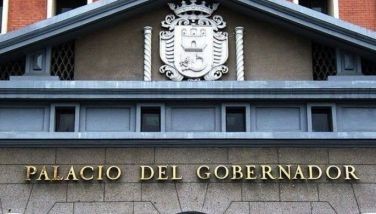Benigno succumbs to liver cancer; 81

June 4, 2005 | 12:00am
"Wrote 30" would have been a bland way to describe the passing yesterday morning of STAR columnist and former press secretary Teodoro "Teddyman" Benigno.
A veteran newsman "who toiled the fields" for close to six decades, Benigno, a former boxer and self-confessed street fighter from Pasay, had always wanted the verbs in his news stories to be "leaping." So how might one describe the exit from this world of a man who lived life vividly and described it with throbbing realism?
Benigno, the bureau chief in Manila of the French news agency Agence France Presse for over two decades, would have crossed out any staid verbs in his obit. He cut his teeth in journalism as a sportswriter and waterfront reporter for the police beat in 1945 and likely would have approved if it were written that he "proudly hung his gloves over the ring after a valiant bout with liver cancer." He was a prizefighter till the end, unbowed till the final bell. He was 81.
"He died quietly," said his wife, Luz Palacios, minutes after he breathed his last at the Makati Medical Center at 6:15 a.m. yesterday.
Benigno was diagnosed with cancer last month, she said. The wake will be held at the Magallanes Village church.
Benigno, whose thrice-weekly columns in The STAR were widely read and admired, attributed his instinct for "leaping" action words to his stint as a sportswriter.
When he was press secretary to then President Corazon Aquino from 1986 to May 1989, Benigno wouldn’t just write "Please disseminate" when dishing out official memos. Instead, he would write, "Please cascade to all members of the staff."
Benigno was invited by then STAR chairman and president Betty Go-Belmonte and publisher Max Soliven after his resignation from government. It is said that to keep that major move under wraps, Benigno and Soliven sealed their negotiations in French.
Benigno’s column, "Here’s the Score," first appeared on the front page of The STAR on June 26, 1989.
In his preface to Benigno’s first column in The STAR, publisher Soliven wrote: "As a veteran newspaperman, political writer, Agence France Presse Bureau chief, linguist, professor, sports columnist and writer-of-all-trades, Teddyman always knows how to keep score."
Benigno, who lived in France from 1964 to 1969 while taking courses in international relations at the Institut d’ Etudes Politiques in Paris, was also the founder and first president of the Foreign Correspondents Association of the Philippines in 1974, two years after the declaration of martial law.
He was proud till the end that the FOCAP never kowtowed to the government during the Marcos dictatorship and for a time was the source of the only genuine news about the Philippines.
Benigno witnessed some of the Philippines’ most turbulent times, especially during the martial law years under the dictator Ferdinand Marcos.
"The night Marcos declared martial law I knew... I instantly knew the world I had lived in since childhood had disappeared, disintegrated," he once wrote.
Born and raised in Manila, Benigno graduated from the prestigious Institut de Sciences Politiques with a master’s degree in political science and studied French at the Alliance Francaise in Paris, both on scholarship.
Benigno, christened "Teddyman" when he joined the Aquino Cabinet in 1986 because there was another "Teodoro" (Teodoro "Teddyboy" Locsin Jr.) in the Cabinet, began his career in journalism as a sportswriter and waterfront reporter for the Manila Tribune. He became sports editor of the Philippine Herald in 1950 before joining the AFP in 1959 as senior editor.
In 1962 he became the AFP’s first Manila bureau chief, a position he held with distinction for the next 25 years.
Fluent in French and an admirer of the country’s culture and history, he was made a Knight of the National Order of Merit in 1980 and received the French Legion of Honor in 1989.
"Teodoro Benigno was an institution in Agence France Presse," said AFP chairman Bertrand Eveno.
"He was both an avid Francophile and an ardent Filipino nationalist. Contemporaries inside the agency admired him not only for his informed reportage and incisive analysis, but also for the courage and passion which he brought to everything he did."
Benigno was also a professor of the French language at the Centro Hispanico in Manila (later International Languages Institute), besides giving special private French language courses to government functionaries.
On Sept. 3, 1986, he was appointed by then President Aquino as her first press secretary.
Benigno covered the late Sen. Benigno "Ninoy" Aquino Jr. extensively, even during the latter’s three-year exile in the US. He was authorized by Mrs. Aquino to write Ninoy’s biography.
As Mrs. Aquino’s first press secretary and spokesman, Benigno had the gargantuan task of establishing the first presidential press office after the dictatorship, presiding over the office’s transition from a propaganda machine to an information and documentation department. This he accomplished while concurrently being presidential spokesman, a task that made it necessary for him to be accessible to the president at all times.
In a statement, former president Aquino said he felt "sad and sorry" over Benigno’s death, adding "Teddy was very supportive of Ninoy and me and I shall miss him. I shall always remember with much gratitude his tremendous efforts in the restoration and defense of our democracy."
Tarlac Rep. Benigno Aquino III said, "My sisters and I will never forget the kindness Teddyman showed our father during the difficult years of his incarceration. He was also a great help to my mother before, during, and after her presidency. The country owes a big debt of gratitude to Teddyman."
President Arroyo in a statement said she joined the readers and staff of The STAR who grieve his loss.
"He was gifted, erudite and thought-provoking. He wrote with flair and a fierce dedication to his principles as a journalist. He will be missed for his candor and passionate views," she said.
Benigno’s former assistant at the press office, Mila Alora remembers him as a "demanding and results-oriented boss, a great teacher and a loyal friend."
According to Soliven, Benigno was offered an ambassadorial post and directorships in government corporations after he left the Cabinet, "but he turned these down."
"He said he wanted to return, with clean hands and a clean conscience, to what he has always loved best — honest journalism," Soliven said of Benigno.
"Philippine journalism has lost one of its greatest men," Soliven said. "Teddy didn’t regard journalism as a job... to him it was a mission. He loved his country and loved his people. We will miss him greatly."
Former senator Raul Roco said, "Teddy Benigno must be having a good laugh. An iconoclast, he debunked institutions and in the process became an institution himself."
Aquino spokeswoman Lourdes Sytangco told AFP the former leader was at the bedside of Benigno late Thursday, hours before he died.
"She lent him a rosary," Sytangco said.
Presidential Management Staff head Rigoberto Tiglao, who covered Benigno as a journalist for the Far Eastern Economic Review, said: "He was a real writer up to the end. I sensed the farewell in his column writing about the people who touched him in his life."
Tiglao said he always looked up to Teddyman as the "epitome of a true journalist-intellectual."
"He was reporting not only on day-to-day events but reflecting always on the bigger picture of nations and society," he added.
Former Associated Press Manila bureau chief David Briscoe said: "I remember Teddy as a tough, principled journalist during the final, tumultuous years of President Ferdinand Marcos. He fought battles for government access and ended in playing a key role in government himself. He’ll be missed by colleagues and friends around the world."
Senate President Franklin Drilon described Benigno’s death as "a great loss to the Fourth Estate... (he) will always be remembered as a stalwart, mightily putting into words his views amidst political upheaval... Teddy wrote with sensitivity, always discerning what lies ahead."
Al Pedroche, editor in chief of Ang Pilipino Ngayon, said "We may have lost a great journalist but we gained an icon who will be an inspiration for all of us journalists to emulate and to draw nuggets of wisdom from, forever."
Teddyman was a recipient of numerous national awards: Rotary Hall of Fame, Rotary Columnist of the Year for several years, and the Catholic Mass Media Award. He also won the much coveted New York TV/Film Festival award for his interviews with former British Prime Minister Margaret Thatcher and former US Secretary of State Henry Kissinger which were aired on his TV public affairs program, "Firing Line."
Benigno was an alumnus of the Malate Catholic School in Manila, the University of Sto. Tomas, and the Lyceum University, where he obtained his AB in Journalism in 1967.
He left behind his wife Luz and son Marc, as well as daughter Nena — also a writer — from a previous marriage. The funeral will be on Tuesday, the family said. — With AFP, AP, Christina Mendez, Paolo Romero
A veteran newsman "who toiled the fields" for close to six decades, Benigno, a former boxer and self-confessed street fighter from Pasay, had always wanted the verbs in his news stories to be "leaping." So how might one describe the exit from this world of a man who lived life vividly and described it with throbbing realism?
Benigno, the bureau chief in Manila of the French news agency Agence France Presse for over two decades, would have crossed out any staid verbs in his obit. He cut his teeth in journalism as a sportswriter and waterfront reporter for the police beat in 1945 and likely would have approved if it were written that he "proudly hung his gloves over the ring after a valiant bout with liver cancer." He was a prizefighter till the end, unbowed till the final bell. He was 81.
"He died quietly," said his wife, Luz Palacios, minutes after he breathed his last at the Makati Medical Center at 6:15 a.m. yesterday.
Benigno was diagnosed with cancer last month, she said. The wake will be held at the Magallanes Village church.
Benigno, whose thrice-weekly columns in The STAR were widely read and admired, attributed his instinct for "leaping" action words to his stint as a sportswriter.
When he was press secretary to then President Corazon Aquino from 1986 to May 1989, Benigno wouldn’t just write "Please disseminate" when dishing out official memos. Instead, he would write, "Please cascade to all members of the staff."
Benigno was invited by then STAR chairman and president Betty Go-Belmonte and publisher Max Soliven after his resignation from government. It is said that to keep that major move under wraps, Benigno and Soliven sealed their negotiations in French.
Benigno’s column, "Here’s the Score," first appeared on the front page of The STAR on June 26, 1989.
In his preface to Benigno’s first column in The STAR, publisher Soliven wrote: "As a veteran newspaperman, political writer, Agence France Presse Bureau chief, linguist, professor, sports columnist and writer-of-all-trades, Teddyman always knows how to keep score."
Benigno, who lived in France from 1964 to 1969 while taking courses in international relations at the Institut d’ Etudes Politiques in Paris, was also the founder and first president of the Foreign Correspondents Association of the Philippines in 1974, two years after the declaration of martial law.
He was proud till the end that the FOCAP never kowtowed to the government during the Marcos dictatorship and for a time was the source of the only genuine news about the Philippines.
Benigno witnessed some of the Philippines’ most turbulent times, especially during the martial law years under the dictator Ferdinand Marcos.
"The night Marcos declared martial law I knew... I instantly knew the world I had lived in since childhood had disappeared, disintegrated," he once wrote.
Benigno, christened "Teddyman" when he joined the Aquino Cabinet in 1986 because there was another "Teodoro" (Teodoro "Teddyboy" Locsin Jr.) in the Cabinet, began his career in journalism as a sportswriter and waterfront reporter for the Manila Tribune. He became sports editor of the Philippine Herald in 1950 before joining the AFP in 1959 as senior editor.
In 1962 he became the AFP’s first Manila bureau chief, a position he held with distinction for the next 25 years.
Fluent in French and an admirer of the country’s culture and history, he was made a Knight of the National Order of Merit in 1980 and received the French Legion of Honor in 1989.
"Teodoro Benigno was an institution in Agence France Presse," said AFP chairman Bertrand Eveno.
"He was both an avid Francophile and an ardent Filipino nationalist. Contemporaries inside the agency admired him not only for his informed reportage and incisive analysis, but also for the courage and passion which he brought to everything he did."
Benigno was also a professor of the French language at the Centro Hispanico in Manila (later International Languages Institute), besides giving special private French language courses to government functionaries.
On Sept. 3, 1986, he was appointed by then President Aquino as her first press secretary.
Benigno covered the late Sen. Benigno "Ninoy" Aquino Jr. extensively, even during the latter’s three-year exile in the US. He was authorized by Mrs. Aquino to write Ninoy’s biography.
As Mrs. Aquino’s first press secretary and spokesman, Benigno had the gargantuan task of establishing the first presidential press office after the dictatorship, presiding over the office’s transition from a propaganda machine to an information and documentation department. This he accomplished while concurrently being presidential spokesman, a task that made it necessary for him to be accessible to the president at all times.
In a statement, former president Aquino said he felt "sad and sorry" over Benigno’s death, adding "Teddy was very supportive of Ninoy and me and I shall miss him. I shall always remember with much gratitude his tremendous efforts in the restoration and defense of our democracy."
Tarlac Rep. Benigno Aquino III said, "My sisters and I will never forget the kindness Teddyman showed our father during the difficult years of his incarceration. He was also a great help to my mother before, during, and after her presidency. The country owes a big debt of gratitude to Teddyman."
"He was gifted, erudite and thought-provoking. He wrote with flair and a fierce dedication to his principles as a journalist. He will be missed for his candor and passionate views," she said.
Benigno’s former assistant at the press office, Mila Alora remembers him as a "demanding and results-oriented boss, a great teacher and a loyal friend."
According to Soliven, Benigno was offered an ambassadorial post and directorships in government corporations after he left the Cabinet, "but he turned these down."
"He said he wanted to return, with clean hands and a clean conscience, to what he has always loved best — honest journalism," Soliven said of Benigno.
"Philippine journalism has lost one of its greatest men," Soliven said. "Teddy didn’t regard journalism as a job... to him it was a mission. He loved his country and loved his people. We will miss him greatly."
Former senator Raul Roco said, "Teddy Benigno must be having a good laugh. An iconoclast, he debunked institutions and in the process became an institution himself."
Aquino spokeswoman Lourdes Sytangco told AFP the former leader was at the bedside of Benigno late Thursday, hours before he died.
"She lent him a rosary," Sytangco said.
Presidential Management Staff head Rigoberto Tiglao, who covered Benigno as a journalist for the Far Eastern Economic Review, said: "He was a real writer up to the end. I sensed the farewell in his column writing about the people who touched him in his life."
Tiglao said he always looked up to Teddyman as the "epitome of a true journalist-intellectual."
"He was reporting not only on day-to-day events but reflecting always on the bigger picture of nations and society," he added.
Former Associated Press Manila bureau chief David Briscoe said: "I remember Teddy as a tough, principled journalist during the final, tumultuous years of President Ferdinand Marcos. He fought battles for government access and ended in playing a key role in government himself. He’ll be missed by colleagues and friends around the world."
Senate President Franklin Drilon described Benigno’s death as "a great loss to the Fourth Estate... (he) will always be remembered as a stalwart, mightily putting into words his views amidst political upheaval... Teddy wrote with sensitivity, always discerning what lies ahead."
Al Pedroche, editor in chief of Ang Pilipino Ngayon, said "We may have lost a great journalist but we gained an icon who will be an inspiration for all of us journalists to emulate and to draw nuggets of wisdom from, forever."
Teddyman was a recipient of numerous national awards: Rotary Hall of Fame, Rotary Columnist of the Year for several years, and the Catholic Mass Media Award. He also won the much coveted New York TV/Film Festival award for his interviews with former British Prime Minister Margaret Thatcher and former US Secretary of State Henry Kissinger which were aired on his TV public affairs program, "Firing Line."
Benigno was an alumnus of the Malate Catholic School in Manila, the University of Sto. Tomas, and the Lyceum University, where he obtained his AB in Journalism in 1967.
He left behind his wife Luz and son Marc, as well as daughter Nena — also a writer — from a previous marriage. The funeral will be on Tuesday, the family said. — With AFP, AP, Christina Mendez, Paolo Romero
BrandSpace Articles
<
>
- Latest
- Trending
Trending
Latest
Trending
Latest
Recommended





























